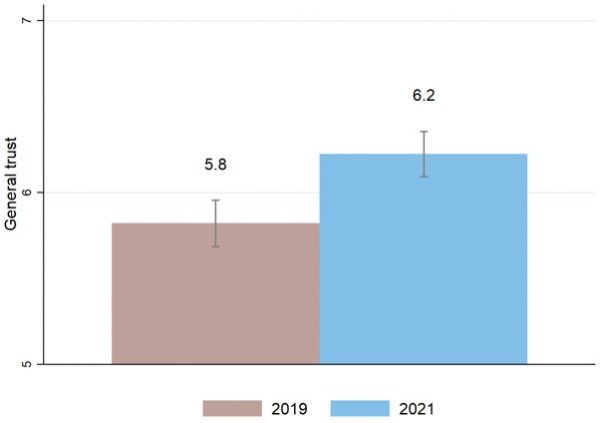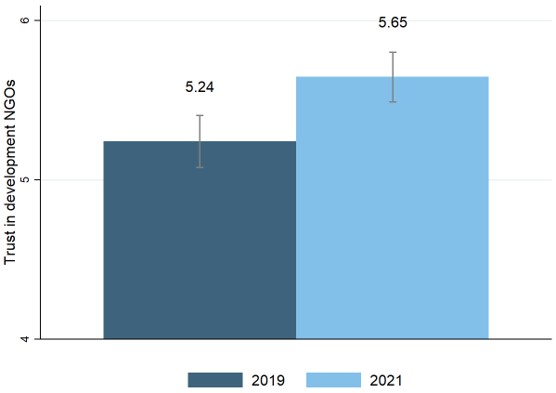Public trust matters for development NGOs. They work in faraway lands. Their impacts aren’t immediately visible. They often depend on donations. If the public doesn’t trust them, funding will fall, and with it the ability to help.
Since 2017, often in partnership with the Australian Council for International Development, I’ve studied Australian public trust in development NGOs. I’ve done this by placing the following question in large, nationally-representative surveys run by well-regarded polling firms.
“Thinking now about Australian non-governmental organisations and charities that do aid work in poorer countries, how much do you trust these organisations to do the right thing all of the time? Answer on a scale between 0 and 10, where 0 indicates you don’t trust them at all and 10 indicates you trust them a lot.”
I last asked this question in December 2019, right on the eve of the coronavirus pandemic. At that point, trust in NGOs had effectively been static as long as we had been running surveys.
Last month I asked the question again, to discover that – all of a sudden – attitudes were changing.
Trust has risen: by about 7%. As you can see in the figure below, the mean response in 2019 was 5.24. This year it was 5.65.
Mean surveyed trust in Australian development NGOs – 0 to 10 scale
That may not sound like an eye-popping shift, but the difference is large enough to be statistically significant. (Large enough, in other words, that it almost certainly didn’t arise by chance.) What’s more, rapid changes are rare in studies of public opinion, particularly over a period as short as the one between December 2019 and May 2021. It’s also the largest change to occur while I’ve been gathering data. And if I look back further, using data from an Australian Charities and Not-for-profits Commission report, the only equivalent change took place over a longer period. It’s an unprecedented rise.
To some, a score of 5.65 might sound disappointingly low. But it’s not that bad. My question is a demanding one. I ask how much the respondent trusts NGOs to do the right thing “all of the time”. In addition, the average response is pulled down by the disproportionately high number of respondents who answer five on the 0 to 10 scale. Some of the fives will be genuine, but some are almost certainly people who simply don’t have a view. With fives removed, the most common responses are seven and eight.
Trust in Australian development NGOs was already quite high, and now it’s going up.
Why is trust in Australian development NGOs on the rise? The most likely answer doesn’t stem from NGOs themselves. Rather, it probably stems from a broader change: Australians are becoming more trusting in general. When I analysed which types of Australians were most likely to trust NGOs in 2019, by far and away the clearest correlation I found was with a general question about social trust that I also asked. Australians who trusted their fellow Australians were more likely to trust development NGOs. The relationship existed even when I accounted for the influence of age, education, gender, where people lived and political orientation.
And when I asked the general question about trust again in 2021, I found an increase that was very similar in magnitude to the one I found in trust in NGOs.
Mean surveyed general trust – 0 to 10 scale
My findings do not appear to be unique. The Edelman Trust Barometer, which is fascinating, but which I would trust more if it came coupled with a clearer explanation of its survey methods, also finds increasing trust in a range of Australian institutions.
Trust is on the rise in Australia. This surprises me: in between headlines about anti-maskers, anti-vaxxers, lockdown avoiders and recurrent COVID-19 outbreaks, the last year hasn’t exactly felt nourishing for the trusting side of people’s nature. Perhaps though, away from the headlines, there’s a different story afoot in Australia – a story of rising cooperation and coordination in the face of a global challenge. Perhaps that’s why trust is higher now than it was in 2019.
Regardless, the good news is that the tide of rising trust appears to have influenced attitudes to development NGOs too. Australians are considerably more likely to trust development NGOs than they were a little over a year ago.
Note
Summary data reported on in this blog, as well as a longer time-series of NGO trust data, are available in this spreadsheet.
Disclosure
This research was undertaken with the support of the Bill & Melinda Gates Foundation and the Australian Council for International Development. The views are those of the author only.



Thanks for sharing. You have provided such an informative and knowledgeable stuff with us. I really admire your all the posts. I also working on Global Maternal and Child Health NGO from last couple of years i.e Antara International. Keep sharing &posting .
Hi Terence,
When I read your blog I, like Ashlee, immediately thought that NGOs have been out of the (bad) news recently so I think that, along with the broader trend you mention, may account for why trust has risen. And I think that there has been a positive social vibe about mutual support, etc, over the last year during covid, so perhaps that just has a little effect too. What will be interesting is to see what difference (if any) it makes to donations. Probably too many other factors working in the opposite direction to see any shift, but we’ll see in due course!
Hi Janet,
Thank you for your comment. As someone who’s been out of Australia for the pandemic, it’s great to hear your take on the social vibe and mutual support over the last year. I agree, that it will be very interesting to see if there is an effect on donations. As you say it will be very hard to isolate any ‘trust effect’, however, from other factors pulling in the other direction, such as higher unemployment & lower incomes. Still, when the donation data come out will be interesting to see what they have to say.
Thanks again.
Terence
Thanks Terence, like you I am surprised that Australians are becoming more trusting overall, I would have assumed that perhaps as our trust in government declined our trust in civil society may have strengthened but I guess that’s not the driver!
Do you think distance from scandal might be a cause of the increase in trust? I am struggling to think of any large international NGO scandal since the Oxfam one in 2018 that has attracted much coverage in the Australian media? Even domestic NGO scandals like the Shane Warne Foundation etc – which I think can dent trust in the charity sector more broadly – seem to have not been big in the news.
Thanks Ash,
Great to hear from you.
The explanation you put forwards is certainly plausible. I don’t think it’s the whole story, because it doesn’t explain the more general rise in trust among Australians covered in the post. But it may well be part of the explanation for NGOs. Not being in the newspapers for the wrong reasons must surely be helping somewhat.
I hope all’s good with you.
Terence
After looking at your spreadsheet I think we should be very careful not to over interpret the data. It is very challenging to accurately measure attitudes using a single item (question) scale. Prof David Andrich in WA has published extensively on this topic. He raises concerns about the technical aspects of reliability and validity, scale construction, size of measurement errors, and the use of cumulative rather than unfolding response mechanisms. For example, most attitude distributions are highly skewed and if this is the case with your data the median is a better measure of central tendency rather than the mean. I’m simply suggesting we need to be careful in interpreting your data.
Hi Scott,
Thank you for your comment. I’m not as concerned as you are for several reasons.
The data aren’t particularly skewed, nor does there seem to be much evidence responses are heavily constrained by the bounds of the scale.
Also, changes aren’t limited to the mean. The median changes from 5 to 6 between the two years. (The change is, for what it’s worth, statistically significant in a Mann-Whitney test.)
In addition, it is hard to see how, “technical aspects of reliability and validity, scale construction, size of measurement errors, and the use of cumulative rather than unfolding response mechanisms” would be the source of the changes between the two years.
I think more valid concerns might be that asking a single question on trust in NGOs asked to a representative sample may well not accurately capture changes in the propensity to donate to NGOs amongst the sub-population that is actually likely to donate. So we shouldn’t necessarily expect the change in surveyed trust in NGOs that emerges from my data to translate into changed donations.
Also, the I’ll concede the second question on trust in fellow Australians probably isn’t an adequate proxy for the suite of questions that are used in surveys specifically focused on general trust. Nevertheless, I suspect it’s capturing some sort of meaningful change, which is worth noting.
Thanks again for your comment.
Terence